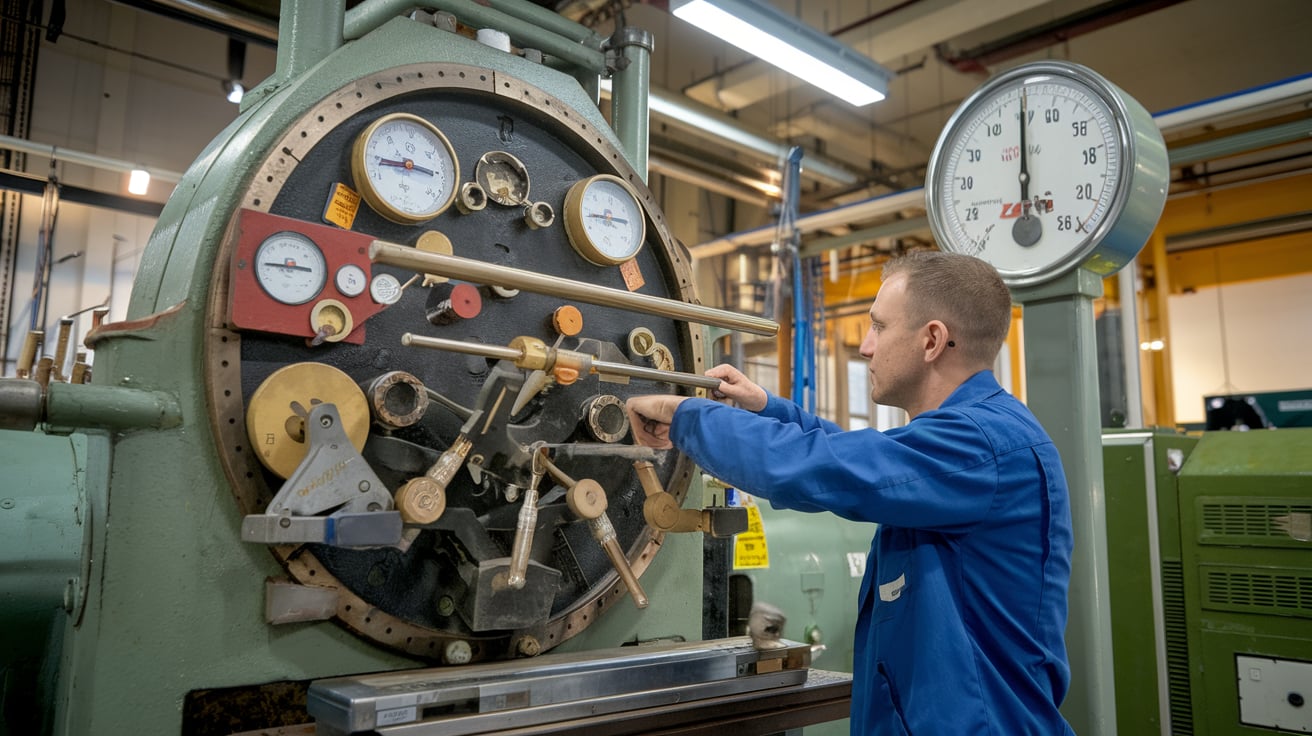Industrial metrology is the science of measurement applied to manufacturing and production environments, playing a pivotal role in ensuring the accuracy, precision, and repeatability of measurements. In today’s technologically driven world, industries such as automotive, aerospace, electronics, and pharmaceuticals rely on industrial metrology to achieve the high levels of quality control required for competitive success.

Understanding how industrial metrology impacts accuracy, precision, and repeatability is crucial for industries aiming to maintain strict production standards and improve product quality.
1. Measurement Accuracy in Industrial Metrology
Accuracy refers to how close a measured value is to the true or accepted value. In industrial applications, achieving high measurement accuracy is paramount, as even slight deviations can lead to defective products or compromised performance.
- Importance of Accuracy: For industries like aerospace or medical device manufacturing, accuracy in metrology ensures the final products meet stringent safety and quality standards. Components that don’t fit or function as intended could lead to critical system failures.
- Methods to Improve Accuracy: Precision equipment like coordinate measuring machines (CMMs), laser scanners, and optical sensors are widely used to increase accuracy. Additionally, employing calibration techniques and adhering to standardized metrological practices (e.g., ISO or NIST standards) helps industries maintain accuracy across various production lines.
Challenges in Accuracy: Maintaining accuracy can be challenging due to environmental conditions such as temperature fluctuations, vibration, or operator error. Addressing these challenges requires regular equipment maintenance and consistent environmental control.
2. Precision in Industrial Metrology
Precision is the degree to which repeated measurements under the same conditions yield the same results. While accuracy measures how close a measurement is to the true value, precision reflects the consistency of those measurements.
- Importance of Precision: Precision ensures that every product manufactured is nearly identical, which is crucial in mass production. For example, in the automotive industry, precision metrology ensures that every engine part, regardless of the batch, will fit and perform correctly within the engine assembly.
- Technologies Ensuring Precision: Advanced metrology tools such as interferometers, high-resolution optical comparators, and automated CMMs enable industries to achieve precision in measurement. Digital metrology systems, which record data automatically, reduce human error, thereby enhancing precision.
- Precision vs. Accuracy: It is important to note that precision does not always equate to accuracy. A system can be highly precise but not accurate if it consistently measures values that are far from the true value. Therefore, both precision and accuracy must be optimized to produce high-quality components.
3. Repeatability in Industrial Metrology
Repeatability refers to the ability of a measurement system to produce the same results under the same conditions across multiple tests. In manufacturing environments, repeatability ensures that each measurement, whether taken by different operators or at different times, remains consistent.
- Importance of Repeatability: Repeatability in industrial metrology is essential for maintaining product quality over time. For instance, in electronics manufacturing, where tolerances are extremely tight, the ability to repeatedly measure components ensures they meet exact specifications throughout production.
- Ensuring Repeatability: Industrial metrology systems designed for repeatability rely on automation and minimizing human intervention. Automated measuring systems equipped with machine learning algorithms can identify variations in real-time, enhancing the repeatability of measurements by adjusting for environmental or process-related changes.
- Calibration and Maintenance: Regular calibration of measuring instruments and systems is crucial to maintaining repeatability. Instruments wear over time, and recalibration ensures that repeatability is preserved, preventing deviations that could affect the quality of the final product.
4. Technological Advancements in Industrial Metrology
As industries evolve towards more advanced production systems, the demand for improved metrology capabilities has driven technological innovation. Automation, digital transformation, and the integration of smart technologies into metrological practices have significantly enhanced accuracy, precision, and repeatability.
- Smart Metrology Systems: The advent of Industry 4.0 has introduced smart metrology systems, which integrate sensors, data analytics, and IoT devices to continuously monitor and adjust measurement processes. These systems help optimize production lines by providing real-time data, reducing downtime, and enhancing repeatability.
- 3D Measurement Technologies: Optical and laser-based 3D metrology tools have revolutionized the ability to measure complex geometries quickly and accurately. These technologies allow industries to inspect components and assemblies in greater detail, ensuring both precision and accuracy across intricate parts.
- Automation and Robotics in Metrology: Automated metrology systems, often integrated with robotics, are becoming more common in manufacturing. They enable real-time, non-contact measurement, significantly improving repeatability and reducing the time taken for quality inspections.
5. Applications Across Industries
Industrial metrology impacts a wide range of sectors, each with specific requirements for accuracy, precision, and repeatability.
- Automotive Industry: In automotive manufacturing, metrology ensures that each part, from engine components to body panels, fits together perfectly, resulting in vehicles that meet performance and safety standards.
- Aerospace Industry: High-precision components are critical in the aerospace sector, where even small measurement errors can have serious consequences. Metrology tools like CMMs and laser trackers help maintain the precision needed in aircraft and spacecraft production.
- Pharmaceuticals: In the pharmaceutical industry, metrology ensures accurate measurement in both product development and packaging. Measuring devices must guarantee that every batch of medication is manufactured with exact dosing and safety standards.
- Electronics Manufacturing: In the production of semiconductors and microelectronics, precision and repeatability are critical due to the minuscule sizes and tight tolerances involved. Advanced metrology tools, such as atomic force microscopes, are used to measure nano-scale features accurately.
Industrial metrology is vital in maintaining high levels of measurement accuracy, precision, and repeatability across various industries. As technology continues to advance, metrology will play an increasingly important role in ensuring the quality and consistency of products in ever more complex manufacturing environments.
https://www.marketsandmarkets.com/pdfdownloadNew.asp?id=190782079
By embracing modern metrological tools and practices, industries can enhance their production processes, reduce errors, and meet the growing demands for precision and reliability in the global marketplace. Whether it’s improving the fit of automotive parts or ensuring the safe production of medical devices, industrial metrology is the backbone of modern manufacturing, making the future of production both more efficient and accurate.
